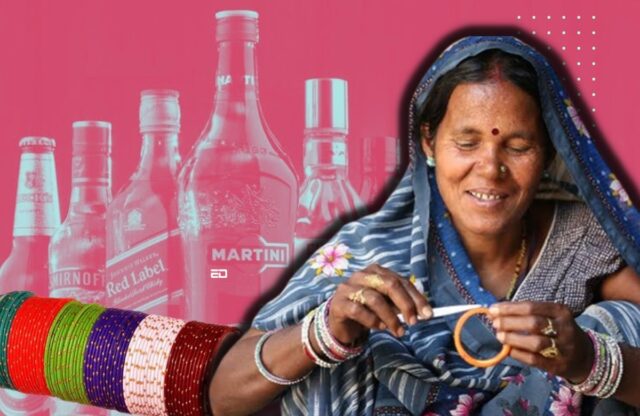The Bihar Prohibition and Excise Act of 2016 imposed a total ban on alcohol in Bihar in 2016. Since then, every month, lakhs of liquor bottles were seized and crushed with JCB machines and other vehicles.
The bottles that were treated as garbage have now become a means of livelihood. In November 2022, the Bihar government decided to set up factories to make glass bangles from the seized liquor bottles. This is a part of the government’s Rural Livelihood Promotion Programme known as JEEViKA.
What Is The JEEViKA Scheme?
JEEViKA is a Bihar rural livelihood project announced on 2nd October 2007. It is funded by the World Bank. It intends to enable the potential of the provincial poor by creating local area institutions and improving their financial conditions by setting up micro-scale businesses.
The Government of Bihar initiated the project in collaboration with the Bihar Rural Livelihoods Promotion Society, which is an independent body under the Department of Rural Development, and Prohibition and Excise Department.
The program is geared towards addressing the Gandhian principles, also mentioned in the Directive Principles of State Policy. Under JEEViKA, self-help groups and their alliances at the ground level are seen as the foundation of development in rural areas.
Also Read: How School Students In Kerala Are Helping Eradicate Poverty

The Factory Is Operational Now
The liquor bottles that were seized during the raids were provided to the JEEViKA workers, who have been trained in bangle-making. The factory was set up for it.
Nitish Kumar, the Chief Minister of Bihar, launched the Sabalpur Jeevika Chudi Nirman Kendra virtually in November 2022. The factory located in Sabalpur, in Patna district, became operational on February 17, 2023. The excise department has supplied approximately 12 tonnes of crushed liquor bottles to the factory.
The furnace in the factory can melt two tonnes of crushed liquor bottles in a single day, which would then be used for making bangles. It is installed in a bushy land in the heart of the village. The unit has the capacity to produce 70,000 to 80,000 glass bangles every day.
How Is It Helping Women?
A team of 20 bangle makers has arrived, from Firozabad to Sabalpur, for providing training to JEEViKA women. Roshni Kumari, the community coordinator of JEEViKA, said, “More than 100 JEEViKA women have got their names listed for the factory.” Most of these women workers have gone through hardships due to their alcoholic spouses.
Sharmila, a worker in the factory, gets ₹220 for 8 hours of work. She is content as the money is sufficient to get her children a decent dinner. Earlier, her husband often beat her in his intoxication. She claims that the abuse has stopped, but still, he does not earn.
The state project manager, Samir Kumar, said, “Altogether 76 JEEViKA women, along with 30 men, have been selected for the work.” Another state project manager, Avinash Kumar, said that the finished bangles would be called Kanchi.
He said, “We have also identified markets. Many Jeevika women, run shops in rural areas. Even the state capital has some dedicated bangle stockists at Chudi Guli and Maroofganj.”
The involvement of rural women and the Self Help Groups, which are registered under the JEEViKA scheme, have begun with the constructive idea. This shows that the primary responsibility of the state is to take brave decisions and move towards a more participatory approach to development.
Image Credits: Google Images
Feature image designed by Saudamini Seth
Sources: Hindustan Times, The Hindu, Indian Express
Find the blogger: Katyayani Joshi
This post is tagged under: bangles, liquor, glass bangles, furnace, Bihar government, JEEViKa scheme, Bihar, India, Patna, Sabalpur, self-help groups, participatory approach, alcohol, alcoholism, hardships, women, abuse, wage, cash, dinner, family, garbage, livelihood, Kanchi, brand, chudi, shops, market
Disclaimer: We do not hold any right, or copyright, over any of the images used. These have been taken from Google. In case of credits or removal, the owner may kindly mail us.
Other Recommendations:
Every House In This West Bengal Village Has The Same Profession































[…] Also Read: Alcohol Bottles Give New Lease Of Life To Afflicted Women In Bihar […]